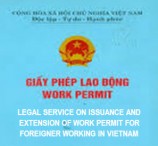Procedures for consular legalization of foreign documents used in Vietnam
Four steps of procedures for consular legalization of foreign documents used in Vietnam
Post date: 28-08-2013
49,629 view(s)
Procedures for consular legalization of foreign documents shall be carried out when foreigners do business or work in Vietnam shall present the competent authorities or partners the necessary foreign documents to support their operation. Vietnam until now has not been a State member of the Hague Apostille Convention 5 October 1961 abolising the requirements of legalization for public documents. When the foreign documents are used in Vietnam, they must be legalized, which will take a cumbersome and costly formalities of a full legalization process.
Some foreigners do not know how to do about the procedures for consular legalization of foreign documents, where to start or complete legalization without proper process, it will take much time and money, but sometime it is not accepted by Vietnamese authorities.
Procedures for consular legalization of foreign documents used in Vietnam will take four steps:

Procedures for consular legalization of foreign documents
Step 1: The documents issued by the competent bodies/organizations of foreign countries must be authenticated at a competent notary of the country where the documents were issued.
Step 2: The notarized documents must be certified by the competent diplomatic body of the country where the documents were issued.
There are two cases:
- Case 2.1: Certified by the competent diplomatic body locates in the country where the documents were issued, for example, the Ministry of Foreign Affairs (as in Hong Kong, USA), or a equivalent body such as the Consular Division - Ministry of Foreign Affairs Malaysia Putrajaya of Malaysia, Tokyo Legal Affairs Bureau of Japan or Singapore Academy of Law of Singapore for the signature and seal of the notary. Next is step 3.1.
- Case 2.2: This case, the documents which were finished step 1 are available in Vietnam. They may be verified by the competent diplomatic body locates in Vietnam in the following cases:
o The signature of that notary (step 1) has been registered with the diplomatic representative body in Vietnam.
o Re-certified the signature in Case 2.1. This case, foreign document finished case 2.1, but it is not certified by the competent diplomatic representative body of Vietnam (that means it not complete case 3.1 of Step 3).
The next step is case 3.2 below.
*Notes for step 2: Procedures for consular legalization of foreign documents
- For the U.S., there is one more step, the Cabinet Director of the state will certify the signature and seal of the notary in that state and then the U.S. Department of State will certify signature and seal of the Cabinet Director of the state.
- For South Korean, this step is waved because Notarized Office has functions of diplomatic body.
- Some diplomatic bodies of several countries are not empowered to conduct the consular certification in Vietnam, such as the U.S., Britain, China, Italy, etc. Therefore, the Consular Legalization must be done directly in these countries.
Step 3: Notarized documents must be certified by the competent diplomatic representative body of Vietnam. There are two cases:
- Cases 3.1: Certified by the competent diplomatic representative body of Vietnam locates in the country where document issued, namely the Embassy, General Consulate or Consulate. This option is only applied for Case 2.1, or
- Case 3.2: Certified by the competent diplomatic representative body of Vietnam locates in Vietnam, named the Consular Department based in Hanoi (from Thua Thien Hue northwards) and the Department of Foreign Affairs in Ho Chi Minh city (from Da Nang southwards). This option is only applied for Case 2.2
*Notes for step 3: Procedures for consular legalization of foreign documents
- There are some cases where there is no diplomatic representative offices of Vietnam in the country where the documents issued, then the documents may be transferred to the diplomatic body of Vietnam in a third neighboring country if the diplomatic representative offices of Vietnam in that country assigned to be in charge of the Consular Legalization of that country.
- In some cases, in some countries in which Vietnam has not put diplomatic relations or has not diplomatic body of Vietnam in the third neighboring country that is in charge of the Consular Legalization of the documents that is issued in those countries (e.g. some countries in Africa), foreign documents will be not consular legalized.
- Step 3.1 is waved in the case a country has diplomatic body in Viet Nam (For example British Consulate, Embassy in Vietnam), foreign documents may be re-certified by such body in Viet Nam and then certified by competent diplomatic body of Vietnam, named the Consular Department based in Hanoi (from Thua Thien Hue northwards) and the Department of Foreign Affairs in Ho Chi Minh city (from Da Nang southwards) for consular legalization.
Step 4: Foreign documents must be translated into Vietnamese and certified the translation by the Justice Division of any District People”s Committee in Vietnam or notary service in Vietnam before being submitted to the competent bodies of Vietnam.
Notes for step 4: Procedures for consular legalization of foreign documents
- Foreign document has Vietnamese language, step 4 is waved.
- Current provisions regarding the Consular Legalization do not provide on the validity of the papers and documents issued by the competent bodies/organizations of foreign countries that have been consular legalized, but not all papers and documents that have been consular legalized will be valid forever when used in Vietnam. In practice, under the guidance of some competent state bodies (including the Department of Planning and Investment of HCM City), the papers and documents that have been consular legalized will only be valid for use within three months from the date of the Consular Legalization. As for the papers and documents that have been consular legalized to be used for other purposes, they will depend on specialized legal documents guiding the case, such as for other papers and documents on marriage - family, the maximum validity for the competent bodies of Vietnam to accept is as 06 months from the time the papers and documents issued to the date submitted to the competent state bodies of Vietnam.
Procedure for consular legalization of foreign documents is the complicated and time and money consuming procedures, it sometimes takes a few months, or longer if we don’t know how to do.
* Vietnam to Recognize Public Documents Certified by an Apostille: Abolishing procedures for consular legalization of foreign documents
Vietnam is expected to become a member of Hague Convention Abolishing the Requirement for Legalization for Foreign Public Documents (the “Hague Convention”) by the end of this year (2013). As a new member, Vietnam agrees to recognize public documents certified by an Apostille (i.e., a form of authentication issued to documents for use in another country). If a foreign business or person’s home country is also a member of the Hague Convention, this will make the authentication process more convenient when doing business in Vietnam.
Businesses operating in Vietnam have long since advocated for accession to the Hague Convention and they will welcome this move as a meaningful business facilitation measure.
For example, the United States is currently a member of the Hague Convention. A business in Vietnam must obtain a work permit for each hired employee from the United States. This means the employee must submit his/her properly authenticated education degree as part of the work permit application. Additionally, United States businesses intending to operate a local representative office in Vietnam must submit their properly authenticated Articles of Incorporation & By laws as part of the business license application.
Currently the steps to properly authenticate these documents include: (i) public notarization by a County Clerk, (ii) Seal of Apostille from the Secretary of State, and (iii) certification by either the Consulate General of Vietnam in California or the Embassy of the Socialist Republic of Vietnam in Washington D.C. Processing time for step (iii) is generally 5 to 7 days. One must also factor in the time for mailing the document to and from the respective agency.
Under the new rule, step (iii) is eliminated which will reduce time, money, and effort that foreign businesses and foreign employees in Vietnam must spend to comply with bureaucratic regulations. In similar fashion, there will also be a reduction in the administrative process for Vietnamese documents submitted for use in the United States (i.e., the requirement for Vietnamese documents to be authenticated by the United States Consulate General in Ho Chi Minh City or the Embassy of the United States in Hanoi will concurrently be eliminated under this new rule).
Any more information, please comment below or contact with us, Click Here
Lawyervn.net
Relate News
- › Consular legalization of Taiwanese documents for use in Vietnam
- › Attestation of Indian documents for use in Vietnam
- › Consular Legalization of Vietnamese documents
- › Legalization of Vietnamese documents for use in Germany
- › Legalisation of government documents issued in Singapore for use in Vietnam
- › Legalisation of non government document issued in Singapore for use in Vietnam.
- › Legalization of documents in US for marriage registration in Vietnam
- › Authentication of U.S documents for use in Vietnam
- › Personal papers not require consular legalization for use in Vietnam














Send your comment